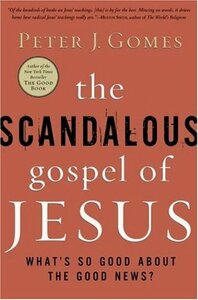Take a photo of a barcode or cover
Harvard chaplain Gomes does a fine job of afflicting the comfortable and comforting the afflicted in this eloquent call to look beyond Jesus as personal savior, and to learn from and realize his demanding teachings. Gomes calls for a return to the vigorous, active social gospel exemplified by Martin Luther King Jr. and the Salvation Army, a religion working towards salvation in this world rather than the next, and that finds loving one’s neighbor incompatible with gated communities and a winner-take-all, materialist theology. Gomes reminds us that the scriptural Jesus – more radical than liberal - would hardly know what to make of the condemnation of homosexuality (which he never mentions) so prevalent among right-wing evangelicals, who are quick to cite the sanctity of marriage even as they blithely ignore Christ’s own explicit precepts against divorce. While the persuasive force of Gomes’ words is hardly lessened by Patrick Lawlor’s mostly serviceable and intelligent reading, it is hard to understand why the author, a gifted preacher with a wonderful voice and delivery, wasn’t enlisted to breathe life into his own spirited words. Still this is a worthwhile purchase for most libraries, and should prove a thought-provoking listen for faithful and non-believers alike, in states red and blue.
Good, but not great. The ramblings of a liberal Christian. And, I don't say this in a negative way, for I myself am liberal in many views. Made for a good read, but I thought the book lost it's luster towards the end as it seemed to become rather repetitive on the same issues (oppression, racism, counter-culture, etc). Although there was some good insight into the teachings of Christ, I didn't think Gomes offered anything new and fresh. I thought there was an over abundance of quotes taken from old hymns that I simply couldn't understand much in the same way I cannot understand Old King James English.
Although liberal on many views I still remain conservative on the issue of homosexuality.... seemingly a highly emphasized issue throughout this book. While I agree wholeheartedly with Gomes that homosexuals should be included in the church, be allowed to serve, and even take on leadership positions, I still maintain that homosexuality is a sin. A sin, like all others that must be confessed, repented from, and dealt with. This does not mean it will be conquered, but action must be taken by the individual to fight it and strive towards victory to defeat it.
I applaud Gomes for his stand for pacifism and inclusiveness, and his stand against biblicism and religious fundamentalism. I also enjoyed his personal stories of meeting famous people throughout his lifetime. And, I appreciated his knowledge of early American religious history for which he frequently alluded to throughout this book. Here are a few quotes taken from "The Scandalous Gospel of Jesus" that resonated with me the most:
"That the image of martyrs, the suffering faithful, and oppressed witnesses to the truth does not seem to be the prevailing images of Christians in the world either in ancient or modern times serves to demonstrate the sad fact that conformity is a greater characteristic of the Christian community than nonconformity." (page 47)
"God is greater and more generous than the best of those who profess to know and serve him." (page 63)
"Perhaps the greatest tragedy of September 11th, 2001, and the life we have come to live in its aftermath, is that we have since been programmed to live by our fears and not by our hopes." (page 104)
"Quoting John Newton: When I get to heaven, I shall see three wonders there. the first wonder will be to see any people there whom I did not expect to see; the second wonder will be to miss many people whom I did expect to see; and the third and greatest wonder of all will be to find myself there." (page 153)
"The means that allows the winds of change to blow through the corridors of conformity is the powerful work of the Spirit, that third member of the trinity that makes the church a slave neither to history nor to the moment , but rather an agency of transformation." (page 204)
Although liberal on many views I still remain conservative on the issue of homosexuality.... seemingly a highly emphasized issue throughout this book. While I agree wholeheartedly with Gomes that homosexuals should be included in the church, be allowed to serve, and even take on leadership positions, I still maintain that homosexuality is a sin. A sin, like all others that must be confessed, repented from, and dealt with. This does not mean it will be conquered, but action must be taken by the individual to fight it and strive towards victory to defeat it.
I applaud Gomes for his stand for pacifism and inclusiveness, and his stand against biblicism and religious fundamentalism. I also enjoyed his personal stories of meeting famous people throughout his lifetime. And, I appreciated his knowledge of early American religious history for which he frequently alluded to throughout this book. Here are a few quotes taken from "The Scandalous Gospel of Jesus" that resonated with me the most:
"That the image of martyrs, the suffering faithful, and oppressed witnesses to the truth does not seem to be the prevailing images of Christians in the world either in ancient or modern times serves to demonstrate the sad fact that conformity is a greater characteristic of the Christian community than nonconformity." (page 47)
"God is greater and more generous than the best of those who profess to know and serve him." (page 63)
"Perhaps the greatest tragedy of September 11th, 2001, and the life we have come to live in its aftermath, is that we have since been programmed to live by our fears and not by our hopes." (page 104)
"Quoting John Newton: When I get to heaven, I shall see three wonders there. the first wonder will be to see any people there whom I did not expect to see; the second wonder will be to miss many people whom I did expect to see; and the third and greatest wonder of all will be to find myself there." (page 153)
"The means that allows the winds of change to blow through the corridors of conformity is the powerful work of the Spirit, that third member of the trinity that makes the church a slave neither to history nor to the moment , but rather an agency of transformation." (page 204)
This was Peter Gomes' last book. It is intended to be the conclusion of his three part work after "The Good Book"and "The Good Life." The title was suggested by his publisher. His preferred title was to have been, "The Good News." It's based on the premise that focusing on worshiping Christ can substitute doing what Christ taught in the gospels. He peppers this work with numerous quotes from theologians, preachers, academics and historical figures as he often did. I appreciate his approach and loving spirit which shine through all his books.
Harvard chaplain Gomes does a fine job of afflicting the comfortable and comforting the afflicted in this eloquent call to look beyond Jesus as personal savior, and to learn from and realize his demanding teachings. Gomes calls for a return to the vigorous, active social gospel exemplified by Martin Luther King Jr. and the Salvation Army, a religion working towards salvation in this world rather than the next, and that finds loving one’s neighbor incompatible with gated communities and a winner-take-all, materialist theology. Gomes reminds us that the scriptural Jesus – more radical than liberal - would hardly know what to make of the condemnation of homosexuality (which he never mentions) so prevalent among right-wing evangelicals, who are quick to cite the sanctity of marriage even as they blithely ignore Christ’s own explicit precepts against divorce. While the persuasive force of Gomes’ words is hardly lessened by Patrick Lawlor’s mostly serviceable and intelligent reading, it is hard to understand why the author, a gifted preacher with a wonderful voice and delivery, wasn’t enlisted to breathe life into his own spirited words. Still this is a worthwhile purchase for most libraries, and should prove a thought-provoking listen for faithful and non-believers alike, in states red and blue.


